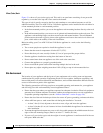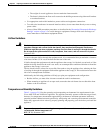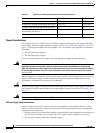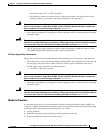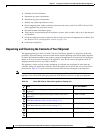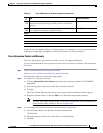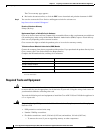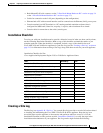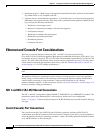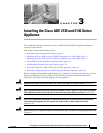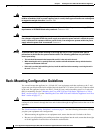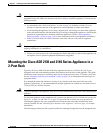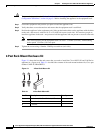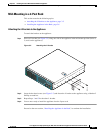
2-16
Cisco Application Deployment Engine (ADE) 2130 and 2140 Series Appliance Hardware Installation Guide
78-18579-02
Chapter 2 Preparing to Install the Cisco ADE 2130 and 2140 Series Appliance
Ethernet and Console Port Considerations
• Installation progress—Make a copy of the appliance Installation Checklist, and insert it into the Site
Log. Make entries as you complete each task.
• Upgrade, removal, and maintenance procedures—Use the Site Log as a record of ongoing appliance
maintenance and expansion history. Each time a task is performed on the appliance, update the Site
Log to reflect the following information:
–
Installation of new adapter cards
–
Removal or replacement of adapter cards and other upgrades
–
Configuration changes
–
Maintenance schedules and requirements
–
Maintenance procedures performed
–
Intermittent problems
–
Comments and notes
Ethernet and Console Port Considerations
There are two network interface connectors (NIC 1 and NIC 2) on the rear panel of the
Cisco ADE 2130 and 2140 Series appliance. Both ports use unshielded twisted-pair (UTP) cable. Cisco
recommends at least a Category 5, 5E, or 6 UTP cable. The maximum segment distance is 328 feet (100
meters). The UTP cables look like the cables used for ordinary telephones; however, UTP cables meet
certain electrical standards that telephone cables do not. (See the “Ethernet Port (NIC 1 and NIC 2)”
section on page 1-11 for UTP cabling specifications.)
Note Two additional NIC ports (3 and 4) can be installed on the rear panel with a NIC personality (mezzanine)
card.
The appliance includes an asynchronous serial console port, which provides access to the appliance
locally (using a console terminal). The following sections describe important cabling information to
consider before connecting a console terminal—either an ASCII terminal or a PC running
terminal-emulation software—to the console port. (See the “Serial (Console) Port” section on page 1-12
for serial (console) cabling specifications.)
NIC 1 and NIC 2 (RJ-45) Ethernet Connections
The NIC 1 and NIC 2 connections support 10BASE-T, 100BASE-TX, and 1000BASE-T standards. The
transmission speed of the Ethernet ports is autosensing by default and is user configurable.
Figure 1-7 on page 1-12 shows the pin orientation of the RJ-45 Ethernet port and the modular cable plug
it accepts.
Serial (Console) Port Connections
The console port on the Cisco ADE 2130 and 2140 Series appliance includes an EIA/TIA-232
asynchronous serial (RJ-45) connector. This serial console connector (port) allows you the capability to
access the appliance locally by connecting a terminal—either a PC running terminal-emulation software
or an ASCII terminal—to the console port.



